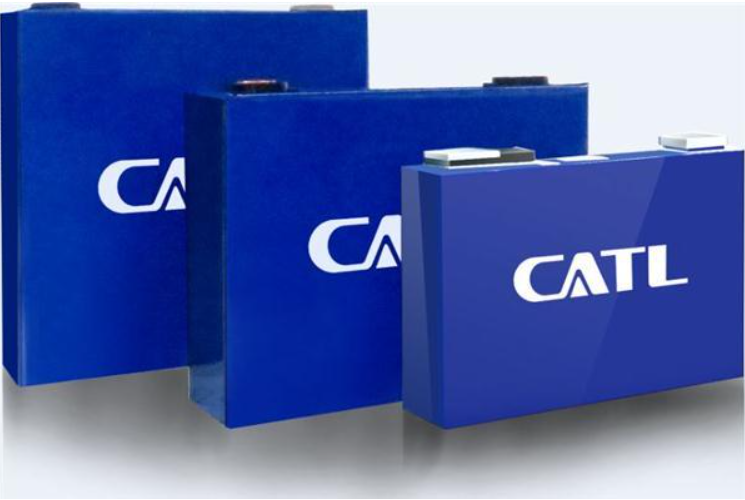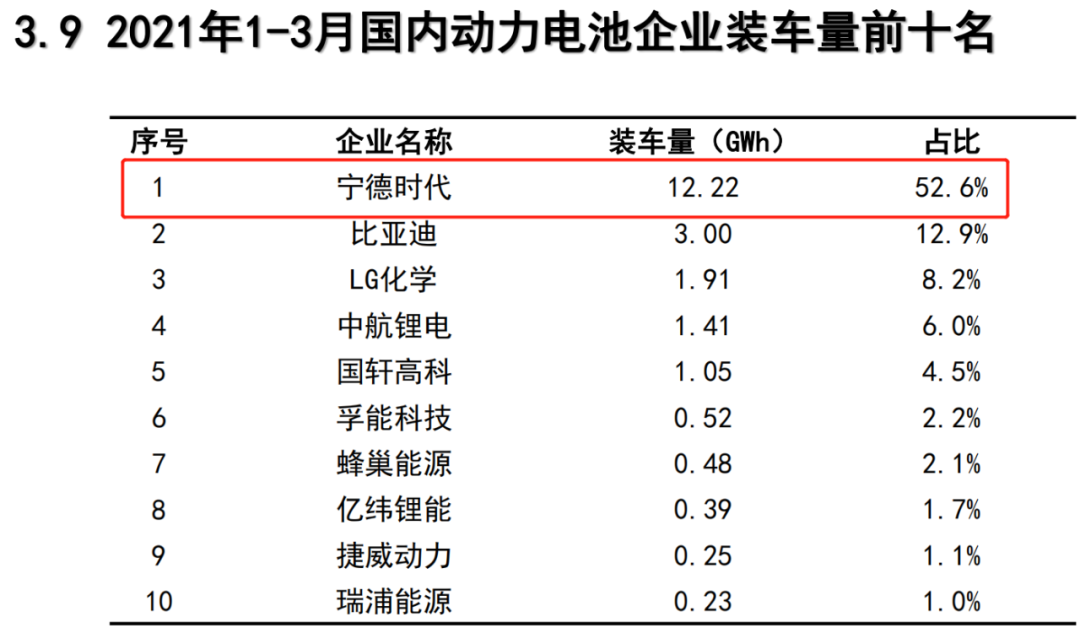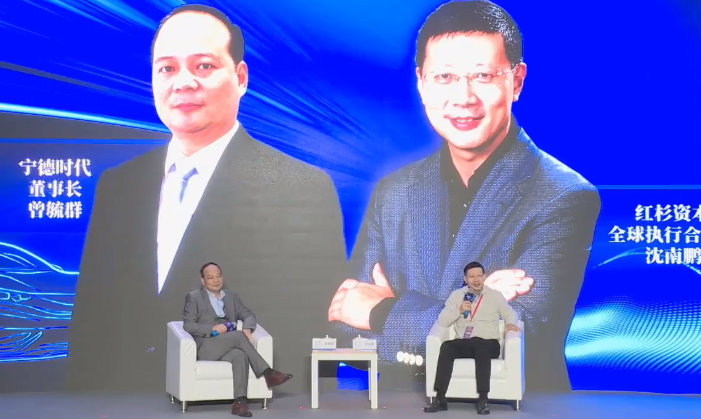*Author: Lingfang Wang
Shen Nanpeng: How many out of 1000 cars on the road will be electric cars after 10 years according to your estimation?
Zeng Yuqun: Around 400.
Shen Nanpeng: If there are only 10 car companies left in the world after 15 years, how many of them do you think will come from China?
Zeng Yuqun: I think 70% of car companies will come from China.
This was a dialogue between Shen Nanpeng, global executive partner of Sequoia Capital, and Zeng Yuqun, chairman of CATL, on April 9th during the 125th anniversary celebration of Shanghai Jiao Tong University, titled “Exploring the Future – High-End Dialogue between New Energy and Smart Electric Vehicle Entrepreneurs and Alumni”.
In this occasion, which was mostly attended by Shanghai Jiao Tong alumni, Zeng Yuqun expressed himself more relaxed and natural when addressing various topics related to CATL’s business positioning, product lines, forms of cooperation with car companies, overseas strategies, as well as his views on fuel cell cars and some of his reflections on battery manufacturing.
Zeng Yuqun said that he did not want CATL to be defined as a battery manufacturer, as CATL has two other major business directions. Regarding the debate between ternary and lithium iron phosphate, he believes that the share of lithium iron phosphate will increase rapidly in the near future.
CATL’s Three Directional Focus
Not satisfied with being just an electric vehicle battery supplier. Zeng Yuqun stated that installing batteries in cars is the foundation of CATL, but they do not want to be defined as a pure electric vehicle battery manufacturer.
Zeng Yuqun elaborated on CATL’s three development directions.
Firstly, they hope to take power batteries as the core, with the goal of replacing mobile fossil energy. Mobile devices such as cars or robots need batteries. The battery is an efficient energy storage device.

Secondly, they hope to combine with the energy storage, power generation, especially new solar cell areas, with the goal of replacing fixed fossil energy, such as constant use of coal.
In terms of energy storage and solar energy, Yongfu shares, in which CATL has invested, represents CATL.
As early as last December, CATL had entered into equity cooperation with Yongfu. On December 8th last year, Yongfu announced that the company’s controlling shareholder and CATL signed a “Share Transfer Agreement”, which transferred its holding of 14.57 million shares (7.9998% stake), valued at 212 million yuan, to CATL. At present, CATL will become Yongfu’s third-largest shareholder.
Yongfu has laid out its plans in energy storage technology and integrated charging stations, and is making efforts in large-scale energy storage power stations.In February of this year, Yongfu shares announced that they plan to cooperate with shareholders holding more than 5% of the company, Ningde Times, to jointly invest in Fujian Yongfu Electronic Communications Technology Development Co., Ltd. through capital increase and stock expansion, in order to achieve deep cooperation and industrial layout in the field of new energy (especially photovoltaics + energy storage).
Thirdly, cooperation in the field of intelligence and electrification in specific areas. Zeng Yuqun mentioned the application in the mining industry and used the word “excitement” to express his feelings when he saw the mine. In his opinion, the entire process from mining to crushing to transportation can be intelligent, without human intervention. “This can save costs, reduce emissions, and ensure safety.”
Specifically, in 2020, Ningde Times and Henan Yuexin Intelligent Machinery Co., Ltd. established a joint venture company which is a typical case. The two parties provide a full-process solution for the technology research and development and industrial promotion of electric and intelligent unmanned mines through resource integration.
Some analysts believe that Ningde Times may provide power batteries for unmanned mining dump trucks, as well as energy storage services for information and digital centers and other infrastructure.
There is more than one layout in the autonomous driving field. Last year, Ningde Times first cooperated with ProLogium to establish an asset operation and management joint venture company, and then led the investment in ProLogium’s autonomous driving star start-up company, Winner Technology.
Winner Technology chose the heavy truck market and focused on the trunk logistics scene, independently developing L3 and L4 level autonomous driving technology.
ProLogium is a company that manages investment in the logistics, real estate, infrastructure, finance and related technology fields, and innovates business.
Cooperation model: production line + long-term cooperation
In the dialogue, Shen Nanpeng asked a very interesting question, “So many car companies need batteries. Your production capacity has been fixed this year. How will Ningde Times allocate batteries?”
Zeng Yuqun said that they have various forms of cooperation with car companies.
He cited two typical forms of cooperation.
One is that the car company has its own plan. For example, a 5-10 year cooperation, with a cooperation volume of 100 GWh. In this case, the car company can take over the production line or pay for the purchase of the production line, which is a relatively large form of cooperation.
Another form is long-term cooperation. For example, signing a long-term cooperation agreement, requiring the car company’s annual output fluctuation to be within ±15%. If the car company’s output does not meet the requirements, it must pay for the difference between them.
In Zeng Yuqun’s view, “a promise without money is not serious.”
Planning: market share and internationalization
Shen Nanpeng asked Zeng Yuqun about the prediction of Ningde Times’ market share by 2030. Zeng Yuqun laughed and said, “If we cooperate well with Shanghai Jiao Tong University, we might have 50-60%, and if we don’t cooperate well, the company may not exist.”
From the installation data, Ningde Times has already taken half of the Chinese market.
Regarding internationalization strategy, Zeng Yuqun believes that they were fortunate to have partnered with BMW when they started producing power batteries. BMW is already an international company, so their batteries can be used in Chinese products and also in their German products.
Therefore, companies like BMW, Mercedes-Benz, Volkswagen, PSA, Jaguar Land Rover, etc. all hope that CATL will invest in Germany, and so CATL went there at their invitation.
However, when it comes to building factories in Germany, Zeng Yuqun said they are more hesitant. “They are slow, the cost is high, and many things are done step by step.” Zeng Yuqun gave an example of how engineering vehicles used for excavating soil may be blocked by villagers when driving through the village, which causes pollution to the environment. Council meetings are needed, and either fines or commitments to make contributions must be made.
“In fact, this is a form of bribery, just in another form,” Zeng Yuqun said, and that this is a long and inefficient process.
Zeng Yuqun believes that the development of the automotive and power battery industry in Germany is indeed worrying.
Optimistic about lithium iron phosphate in the near future, no solid-state vehicles for 3-5 years
Shen Nanpeng also mentioned the issue of technical routes and the proportion problem between the two technical routes of ternary and lithium iron phosphate in 3-4 years.
Zeng Yuqun believes that the growth rate of lithium iron phosphate batteries will be very fast because they are relatively cheap. He explained that as more and more charging stations are built, the range of electric vehicles does not need to be that long. “People who have never driven an electric car may be more anxious, but those who have driven one are less anxious, so the proportion of lithium iron phosphate will gradually increase, and the proportion of ternary will decrease.”
Zeng Yuqun also gave an interesting example. When he was a student at Jiao Tong University and felt hungry while studying late, he would buy steamed buns. Sometimes he would buy four or six, but he could only eat two or three. “It’s like the range of an electric car. You need 600 kilometers, but 200 kilometers is enough.”
However, there are still many high-end vehicles that require long range and high energy density of ternary batteries.
Zeng Yuqun had already been optimistic about lithium iron phosphate batteries several years ago. “I remember three years ago, someone told me that they wouldn’t use the technology of lithium iron phosphate because it had no business. They said that 80%-90% were ternary, so lithium iron phosphate would disappear soon. I told him he was completely wrong and to hurry up and develop it. Companies like German nanometer followed my advice, and it’s doing very well now. Lithium iron phosphate is sure to have huge applications.”
How will changes in product structure affect the upstream materials of batteries?## Changes in the Supply Chain of Ternary Materials
According to Zeng Yuqun, there will be significant changes in the supply chain of ternary materials. This is because the amount of nickel and cobalt will decrease, but the usage of other materials, such as phosphate or lithium carbonate, will remain different. Lithium carbonate will also decrease. This is due to the different amounts of cobaltous oxide or lithium carbonate used by ternary or lithium iron phosphate systems per ton.
However, Zeng Yuqun believes that the future may not necessarily be limited to ternary and lithium iron phosphate systems. “We have something new, but I won’t talk about it now.”
As for solid-state batteries, Zeng Yuqun predicted that within 3 – 5 years, none of them in cars will be full solid-state batteries.
Fuel Cell Production Costs Unable to Compete with Electric Vehicles
During the conference, a student also asked about the future of fuel cell vehicles. Zeng Yuqun believes that, as a car power source, fuel cells are unlikely to be cost-competitive with electric vehicles in the future. Hydrogen fuel is a good form of storage, such as with Sichuan hydropower, where it can be converted into hydrogen when there is plenty of water without requiring high pressure (cars require 700 atmospheres of pressure).
In Zeng Yuqun’s view, fuel cells are a medium that conducts electricity between cells. Hydrogen fuel can be transported from Sichuan to places facing power shortages, where it can be used for power generation. However, batteries are expensive and transporting them is also costly.
Zeng Yuqun believes that hydrogen fuel cell vehicles are not as good as ideal range extenders. “A large battery can be placed in the front and a power-generation device can be placed in the rear. It doesn’t have to be hydrogen fuel, but if there is 100% no carbon emissions, I might use hydrogen as a range extender. However, I think the entire system is still too complicated.”
Zeng Yuqun has deep insights into battery production. He believes that making batteries is not difficult, as a battery core can be made easily in the laboratory. However, batteries are hazardous goods, and with 100 batteries connected in a car, 1 billion battery cores would be found in 10 million vehicles undergoing 1000 charging and discharging cycles. If there is a problem resulting in combustion during any of these 100 billion charging and discharging times, people will believe that there is a problem with the car.
In Zeng Yuqun’s view, making batteries is easy to learn but hard to master. Anyone can make a battery, but making a good one is really challenging. Making batteries involves hard work, persistence and focus. “In the past, the manufacturing industry talked about Six Sigma (1 in a million), but now it needs to be up to PPb level (1 in a billion), and must achieve extreme manufacturing.”
This article is a translation by ChatGPT of a Chinese report from 42HOW. If you have any questions about it, please email bd@42how.com.
